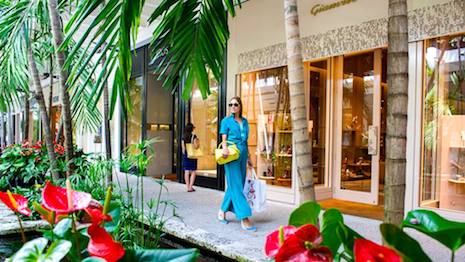- About
- Subscribe Now
- New York,
October 29, 2018

 Shoppers walk into stores with more information than ever before. Image credit: Bal Harbour Shops
Shoppers walk into stores with more information than ever before. Image credit: Bal Harbour Shops
While retailers continue to leverage product reviews to motivate consumer spending, a growing number of shoppers are also turning to store reviews to evaluate bricks-and-mortar locations.
According to a new survey conducted by Uberall, 19 percent of respondents admitted to always checking platforms such as Google or Yelp for store reviews when deciding where to shop. A majority of consumers also believe brands should reply to every review posted about a store.
"The biggest takeaway for retailers from our report is not only the importance of responding, but even more so of making these interactions personal and meaningful," said Josha Benner, cofounder of Uberall, San Francisco. "Most store owners understand that reviews are such a big part of what gets people in the door.
"What they might not know is that people actually expect businesses to pay attention to reviews and appreciate this form of feedback to always strive for highest customer experience, too," he said.
Uberall surveyed more than 1,000 consumers throughout the U.S. in October.
Shopping experiences
Despite the growth of ecommerce sales, in-store experiences continue to enjoy popularity among shoppers and cannot be neglected by retailers. By checking store reviews, consumers better know what to expect from a shopping trip.
Retail environments are evolving to become more experiential and engaging, as more brands add bars, coffee stands and even pop-up exhibits to their sales floors (see story).
"A store experience is often based on a number of disparate parts," Mr. Benner said. "You might be subjectively evaluating store associate interactions, the in-store availability of products or sanitary conditions of a location – all together."
American shopping malls are still valuable in the luxury world. Image credit: JLL
A majority of respondents, 57 percent, occasionally check customer reviews when deciding where to shop, while nearly a fifth are in the habit of always checking store reviews. Only 7 percent "very rarely" search for information about a particular store location.
Eighty-six percent of respondents said they would be more likely to shop at a store that responds to customer reviews. Less than 15 percent of consumers said they would be "somewhat less likely" or "less likely" to visit a store that did reply to online reviews.
Balmain's store on Milan's Via Montenapoleone. Image courtesy of Balmain
Meanwhile 65 percent believe stores should reply to every review, whether it is positive or negative. A positive review is considered to be a score of four and up, on a scale of one to five, according to 39 percent of respondents.
To put higher expectations on brands, 78 percent of consumers also believe replies should personalized rather than generic. Less than 10 percent said that they did not expect responses to be personalized.
Locations and recommendations
Online searches play a key role at driving in-store traffic for retailers. Showing the importance of mobile to bricks-and-mortar retail, more than half of those who use their phones for shopping seek out store hours or locations, according to a previous report from Uberall.
More than 80 percent of consumers are using their mobile phones to search for retailers, products and more that are near them at the moment. Leveraging the keywords “near me” and gaining visibility in these localized searches is a key way to get consumers in the door.
About seven in 10 consumers use their smartphone to facilitate shopping tasks, the most popular of which is researching products. Consumers also turn to their phones to compare prices or look for deals (see story).
In addition to store reviews, marketers and retailers need to be aware that product recommendations have a long-term impact on brand loyalty and customer lifetime value, beyond short-term conversions.
When customers engage with product recommendations, there is a 70 percent increase in purchase rates in initial and subsequent sessions, according to a study by Monetate. Product recommendations are instrumental in keeping online shoppers engaged.
For retailers to benefit from product recommendations, it is crucial to make relevant recommendations. To drive engagement, recommendations must also be personalized (see story).
"Products can be returned or exchanged if a customer isn’t happy," Mr. Benner said. "A bad experience at a store is more of a death knell for a brand.
"Customers favor businesses that truly care about them and take the time to personally respond," he said. "And it’s not only a sign of courtesy – it will also lead to an uptick in new customers, and by such to more repeat business.
"It’s no longer about triaging when there’s a bad experience," he said. "You have to have an always-on, proactive strategy in place."
Share your thoughts. Click here